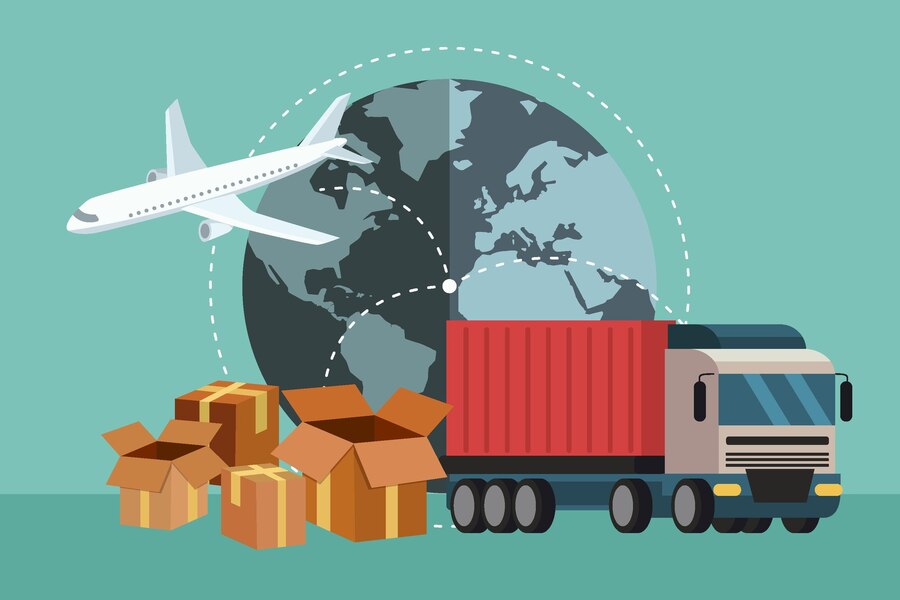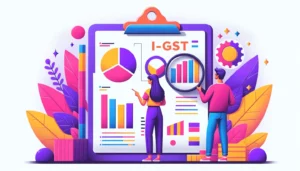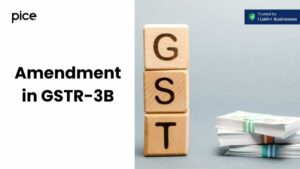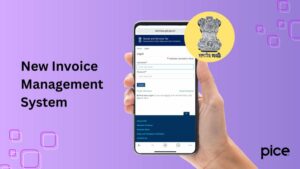Know All About GST on Sale of Import License
- 20 Sep 24
- 17 mins

Know All About GST on Sale of Import License
Key Takeaways:
- Simplification and uniformity: GST has unified the tax structure for import licenses, making the tax implications more straightforward.
- Input Tax Credit: Businesses can reduce their overall tax burden by availing of the ITC for GST paid on the sale and purchase of import licenses.
- Compliance and Transparency: The GST regime has enhanced the compliance and transparency of transactions involving import licenses.
- Challenges in Compliance: Despite the benefits, businesses must navigate through compliance challenges, understand GST rates, and stay updated with policy changes.
- Leveraging Technology: Adopting digital solutions like the PICE application for GST payments is crucial for managing GST compliance efficiently.
In today's globalized economy, the sale and purchase of import licenses have become a common practice among businesses looking to import goods into their home country. With the introduction of the Goods and Services Tax (GST) in many countries, there have been significant changes in how these transactions are taxed.
This article aims to demystify the concept of GST on sale of import license, providing a comprehensive overview of its implications, calculation methods, and the legal framework surrounding it.
What is GST on the sale of import license?
GST is a value-added tax levied on most goods and services sold for domestic consumption. It is designed to be comprehensive, encompassing all stages of the supply chain of services, and is intended to be refunded to all parties in the various stages of production other than the final consumer.

An import license is a governmental authorization required for the importation of goods that are not freely importable. Licenses of this form restrict the number of items entering a country to exactly the requirements of those products and the country's customs regulations.
In the case of a talk over the GST implications of the sale of licenses for import into India, it is necessary to be able to consider such components that are interconnected with this theme.
The issue of import licenses like the Merchandise Exports from India Scheme (MEIS) licenses is a hot topic among the business entities actively involved in the sale abroad. The government primarily offers the licenses as a financial incentive to exporters, and once granted, they become commodities.
GST on Sale of Import License
The GST framework, introduced in India in July 2017, aimed to consolidate multiple indirect taxes into a single tax, intending to create a more streamlined and efficient taxation system.
However, the applicability of GST on the sale of import licenses has been a subject of interpretation and clarification from tax authorities.
- Compliance and Liability: The sale of import licenses is considered a supply under the GST law, thus attracting GST. Businesses involved in the buying and selling of these licenses must ensure compliance with GST regulations, including registration, filing of returns, and payment of tax. The liability to pay GST arises at the time of supply of services, which is determined based on specific provisions related to the transfer of business assets or other forms of supply.
- Transaction and Benefit: From a transactional perspective, the sale of an import license at a time is treated as a service. The seller of the license provides a 'benefit' to the buyer, allowing them to import goods at a reduced duty or no duty. This transaction falls within the ambit of GST and is taxable under the current laws. The rate of GST applicable depends on the classification of the service under the GST tariff.
- GST Rates and Input Tax Credit: The GST rate for the sale of services, including the transfer of import licenses, is determined based on the GST council's decisions. Businesses involved in these transactions can avail of input tax credit (ITC) for the GST paid on the purchase of these licenses, subject to meeting the conditions laid out for ITC eligibility.
- Compliance with E-Way Bill and E-Invoicing Requirements: For transactions involving the sale of import licenses, compliance with the e-way bill and e-invoicing requirements may be necessary, depending on the transaction value and the regulatory mandates at the time. These digital compliance mechanisms are introduced to increase the effectiveness of a tax administration system and decrease tax evasion.
- Challenges and Considerations: Despite the clear applicability of GST on the sale of import licenses, businesses may face challenges in determining the exact tax liability, especially when the valuation of such licenses is subjective.
Additionally, the evolving GST regulations and frequent updates by the GST council necessitate keeping abreast of the latest tax norms and interpretations.
The Impact of GST on sale of Import License
The application of GST to the sale of import licenses has streamlined tax administration and removed the cascading effect of taxes. This chapter examines the ways in which GST influences the cost, compliance, and competitiveness of businesses engaged in import
The GST Impacts on sales of Import License aims to outline the most significant changes in business life when importing goods with specific licenses resulting from GST.
- Service Sector Shifts
With GST's rollout, the service sector, especially entities facilitating import of inputs and exports, encountered a major shift. Import licenses, essential for legally importing certain goods, now fall within GST's scope.
This evolution has resulted in pricing complexities and compliance complexities for service providers; hence, there is a need some accurate filing practices to navigate the tax implications properly.
- Enhanced Filing Requirements
GST has complicated the filing process for transactions involving import licenses. High quality documentation and regular claims submission deadlines are essential to avoid fines.
The classification of import license transactions as services results in GST being attracted; hence, it is vital for tax return filing to be done meticulously to be in compliance and manage tax obligations.
- E-Way Bill Foundation
The introduction of the e-way bill system under GST has notably affected logistics for goods imported under licenses. The E-Way Bill system requires generating an electronic bill for transporting goods above a certain value threshold, including those imported through licenses, and adding a compliance layer for businesses to document and tax the movement of goods properly.
- Operational Timing
In the GST era, the timing of import license transactions has become more crucial. The dates of issue, transfer, or use of import licenses can influence tax liabilities and the eligibility for input tax credits.
Businesses need to keep a close eye on their operations so that they are compliant with GST aspects, and thus no tax bill surprises or loss of benefits are possible.
- Customs and GST Dynamics
The relationship between basic customs duties on imports and GST has grown more complex. Although GST does not include customs duties, understanding the combined impact of both on the tax burden is vital.
To prevent mistakes, businesses need to understand the tax implications that go hand in hand with their import licenses.
- GST Council's Role
The GST Council significantly influences tax rates, exemptions, and guidelines affecting import licenses. Policy changes or rate adjustments by the Council can directly affect the GST treatment of import licenses.
To keep themselves in tune with the regulations set by the Council, it is vital for the business to simultaneously change the compliance setup and operation.
- Filing of Returns Impact
Filing GST returns necessitates accurate reporting of transactions involving import licenses, impacting compliance and financial outcomes. This entails the rights of both importation and licensing and use, ranging from simple to complex licenses, reinforcing the need for compliance and financial optimization.
- Documentation Importance
Under GST, maintaining detailed bills and documentation, including invoices related to import licenses, has become more critical. Proper documentation is the prerequisite for meeting compliance, return filing, and input tax credit processes.
This section explores the legislative measures, perceptions, and statutory provisions which are applicable for GST on import licenses.
- Legal Framework Surrounding GST and Import Licenses
Understanding the legal landscape is crucial for businesses to ensure compliance and avoid penalties. This part delves into the regulations, guidelines, and statutory provisions governing GST on import licenses.
How is GST calculated on Sale of Import licenses?
The Goods and Services Tax (GST) calculation on the sale of import licenses in India involves understanding how these transactions are treated under the GST framework.
Import licenses, which grant the holder the right to import goods that may be restricted or regulated, are considered a service when they are sold or transferred. Here's a simplified breakdown of how GST is calculated on these transactions:

- Determination of Taxable Supply Service Classification
The sale of an import license is classified as a supply of services under GST. This is because it involves the transfer of certain rights for consideration, which fits the definition of a service in the GST context.
- GST Rate Applicability
Applicable Rate: The GST rate applied to the sale of import licenses depends on the specific rate notified for such services under the GST rate schedule. Rates may vary based on the nature of the service and any specific categorizations or exemptions provided by the GST Council.
- Determination of Taxable Supply Service Classification
The sale of an import license is classified as a supply of services under GST. This is because it involves the transfer of certain rights for consideration, which fits the definition of a service in the GST context.
- GST Rate Applicability
Applicable Rate: The GST rate applied to the sale of import licenses depends on the specific rate notified for such services under the GST rate schedule. Rates may vary based on the nature of the service and any specific categorizations or exemptions provided by the GST Council.
- Value of Supply
Consideration Received: The value of the supply of services is the total consideration received for the sale of the import license. This includes any amount received in money or kind, and it forms the basis for calculating the GST payable.
Inclusions and Exclusions: It's important to include any additional charges or expenses charged to the buyer in the value of supply before calculating GST. However, any discounts or rebates provided as per the terms of the agreement and recorded in the invoice can be deducted from the value of supply.
- GST Calculation
Formula: The GST on the sale of an import license is calculated by applying the applicable GST rate to the value of the supply. If the GST rate is 18%, and the sale price (value of supply) of the import license is INR 100,000, the GST would be calculated as follows:
GST= Value of Supply × GST Rate= = 100,000×18% = 18,000GST=Value of Supply × GST Rate = 100,000×18% = INR 18,000
- Invoice and Payment
Tax Invoice Issuance: The seller must issue a tax invoice to the buyer, detailing the value of the import license sold, the applicable GST rate, and the total GST charged.
GST Payment: The seller is responsible for remitting the collected GST to the government. This is done through the periodic GST returns filed by the seller.
- Input Tax Credit (ITC)
ITC for Buyer: The buyer of the import license, if registered under GST and using the license for furtherance of business, may be eligible to claim an input tax credit for the GST paid on the purchase of the import license. This is subject to the fulfillment of other ITC eligibility criteria as per the GST law.
Benefits of GST on Import Licenses
The reform in the Indian taxation system with the introduction of the Goods and Service Tax (GST) has had a long-term impact on business operations, in particular how import licenses are treated.
This article, "Benefits of GST in the Use of Import Licenses, is created to reveal the way GST affects the use and sale of import licenses, what benefits emerged after the implementation of this new tax system.
- Simplification and Uniformity
One of the primary benefits of GST on import licenses is the simplification and uniformity it brings to the tax structure. Prior to GST, businesses dealing with import licenses had to navigate through a complex array of taxes, including VAT, service tax, and other state-level taxes, which varied from one state to another.
GST has unified these under a single tax regime, making the tax implications of selling or transferring import licenses more straightforward and predictable.
- Input Tax Credit (ITC) Mechanism
GST allows businesses to claim Input Tax Credit (ITC) on the tax paid on goods and services, including those related to import licenses. This means that if a business pays GST on the sale of an import license, it can offset this against its GST liabilities on other goods and services, effectively reducing the overall tax burden.
This ITC mechanism under GST enhances the operational efficiency of businesses by lowering the cost of importing goods and services.
- Enhanced Compliance and Transparency
GST structure requires thorough documentation by all traders, along with digital filing of returns, which you know leads to improved compliance and transparency in matters related to import license holder transactions.

This digitalization of records and filings under GST results in financial transactions being less vulnerable to being misused and makes the tax administration more transparent.
- Removal of Cascading Tax Effects
Under the previous tax regime, taxes were levied on an accumulative basis, leading to a cascading effect where tax was paid on tax. GST has eliminated this effect by integrating various taxes into a single tax, applied only on the value addition at each stage.
It is through this elimination of the cascading effect of taxation that the transaction cost of import licenses, which is sale and transfer, is reduced, thereby resulting in a less costly business.
- Boost to International Trade
The streamlined tax structure under GST, along with the benefits of ITC and the removal of cascading taxes, has potentially lowered the cost of imports, encouraging international trade.
Businesses that rely on import licenses for their operations find it more viable to engage in import of inputs activities, as the simplified tax regime under GST makes the process more efficient and less costly.
- Challenges and Considerations
While GST on import licenses has its advantages, businesses may face challenges in compliance, understanding tax liabilities, and managing increased administrative burdens. Here, we outline the obstacles and address how to overcome them.
- Compliance Burden: Despite efforts to streamline taxation, GST compliance remains a significant challenge for many businesses. Accuracy and timeliness in documentation/filing returns and compliance with GST regulations will require considerable effort, especially from SMEs that are constrained by their limited resources.
- GST Rates: The GST regime categorizes goods and services into various tax slabs. What applies for transactions in import licenses, GST rates are complicated, knowing GST laws in depth and all updates is required.
- Input Tax Credit (ITC) Eligibility: While the ITC mechanism is a significant advantage of GST, understanding and meeting the eligibility criteria for claiming ITC on import licenses can be challenging. Businesses must ensure proper documentation and compliance to benefit from ITC.
- Digital Compliance Requirements: GST mandates digital compliance, including e-way bills and digital filing of returns. Businesses unprepared for the technology shift may find it difficult and expensive to make the necessary investment and train their staff to adapt to the new technology.
- Navigating Changes and Updates: The GST Council frequently reviews tax rates and policies, leading to changes and updates. Tax compliance becomes difficult and complicated without in-house tax professionals keeping track of these changes.
Conclusion
The impact of GST on the sale and purchase of import licenses in India has been profound, offering both opportunities and challenges for businesses. While GST has simplified the tax regime, making the process more efficient and potentially less costly, businesses must navigate compliance requirements, tax liabilities, and the digital shift in tax administration.
By understanding the implications, calculation methods, and legal framework of GST on import licenses, businesses can better position themselves to leverage the benefits while mitigating the challenges associated with this significant tax reform.
💡Businesses that want to simplify the compliance and payment processes for e-way bills should adopt digital solutions. PICE is actually a revolutionary application of GST payment that provides an all-in-one solution to the transition process of GST, simplifying the management of GST.
 By
By 


















